IntroductionThe Classical World refers to the time period in Troja, Roma, Greece, India & China. The Hellenic Classical period spanned two centuries between the 5th and 4th Century B.C. The significance of this period spans to even Today's World. A lot of the customs and philosophical worldviews of The West came out of The Classical World. Notable figures like Aristotle, Socrates, Plato, Alexander The Great and Leonidas are ingrained in our minds for all time came out of The Classical World. The Start of The Classical World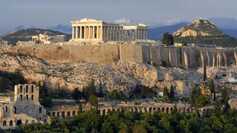 The Classical Greek Period began in The 5th Century B.C. The Start of this era was sparked by The Ionian revolt against Persian dominance in The Aeolis, Doris, Cyprus & Caria regions. This would cause The Persians to invade in 492 B.C. and eventually be defeated in 490 B.C. by Darius I in The Battle of Marathon. The Battle of Marathon actually plays part in the origin in Today's Worlds Marathon Race. In the legend, it is stated that after The battle was won, an Athenian Messenger was sent off from Marathon to Athens, a distance of 40 Kilometers or 25 Miles. Once he got to Athens, he collapsed and died of exhaustion. Today Marathons, which are now 26.2 Miles, are ran daily but runners from Around The World. The First Peloponnesian Wars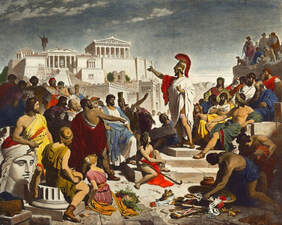 In 431 B.C. conflict amongst two leagues of The Greek-City States broke out. The two leagues thrust into combat were The Delian League and The Peloponnesian League. The Delian League were made of multiple Greek-City States commanded by Athens. The Peloponnesian League had Sparta as its Leader. Sparta is itself a Greek City State that earlier in 510 B.C. helped Athens overthrow their sovereign, King Hippias. Athens replaced its Monarchy with Democracy in 507 B.C. Back at the time it was called Demokratia. Demo in Greek is People and Kratos in Greek translates to Power. People's Power or Rule of The People would be its full translation. Now whether or not this was a good thing is still up for debate. Aristotle, a Classical World Philosopher stated "Democracy arouse from men's thinking that if they are equal in any respect they are equal absolutely." Aristotle had other protest to Democracy including that for it too work all must be virtuous while in monarchy only one must be. Sparta had a Diarchy. A Diarchy is a government with to sovereign heads. The first advance by The Spartans in the conflict was to breach Attica. The Athenians were able to Maintain Attica from the Spartans by drawing back behind the walls. After years of combat no clear victor was decided and 421 B.C. The Peace of Nicias was established by Athenian Leader Nicias. The Peace of Nicias was also known as The Fifty Year Peace; it was signed by Athens and Sparta in March of that year. 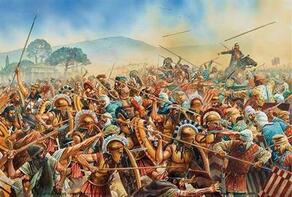 Strife amongst Argos and Sparta came to being in 418 B.C. Even with Athenian support Argos fell to Sparta and Argos & The Peloponnesus were conquered. The restoration to peace for Athens helped build The Athenian Empire due to finances being brought back into order and trade opening up. The restraint for war and the emphasis on growing the economy brought upon the Peace Party. This did not go without attention from another Greek city-state however. Conflict with Melos, started during a failed attempt to force Melos to join the Delian League back in 477 B.C. In 416 B.C. the boiling point for The Athenian thirst for combat was quenched by The Island of Melos. Melos was plundered by Athens and occupation of the island was by Athens. The hunger for conflict would not keep Athens full for long. In 415 B.C., The Sicilian Expedition henced. Alcibiades urged Athens to launch an invasion of Syracuse, a region in Sicily would was allied with The Peloponnesians. 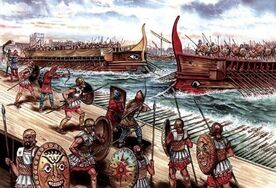 Unlike the battles with Melos, the war with Syracuse was split in interest by The Athenian people. Some wanted it and some did not. Even so, in 415 B.C. Athens departed for Sicily. One the eve of the expedition, the Peace Party were believed to have vandalized The Greek god Hermes statues, spreading the pieces all through Athens. This of course would have been a protest to the war with Sicily. This was a desperate action taken by The Peace Party after losing the debate on war with Sicily. The Action taken by The Peace Party was seen as a bad omen, and it probably was since the expedition was a utter failure. In fact Nicias was captured and executed. 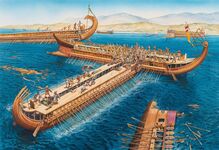 Later on Sparta, with monetary assistance from the Persians, built a naval fleet to attack Athenian Supremacy over the seas. Rookie Military Leader Lysander attacked Abydos by occupying Hellespont. Hellespont was a source of grain for Athens. Facing severe famine, Athens sent all of its fleets to defy Lysander. In 405 B.C. in Aegospotami, Athenian fleets were crushed. With this, Athens was faced with potential Bankruptcy and 404 B.C. asked for Peace. Sparta did not comply and Athens lost their fleet, their city walls and all their belongings overseas. Lysander withdraw Athens democracy and installed a Oligarchy known as The Thirty Tyrants. Athenian dominance was over. The rise and fall of sparta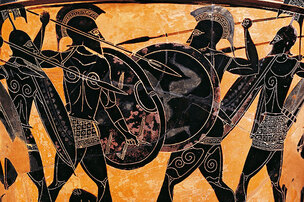 The Spartans were now The Masters of The Classical World. Their short-minded warrior mentality did not mix well with this new role however and 9 years, The Power of democracy returned to Athens. Sparta removed Lysander, and Sparta lost its naval supremacy. Greek city-states; Athens, Argo, Thebes, and Corinth, challenged Sparta's dominance in the Corinthian War, which ended in 387 B.C. with no clear victor. In 378 B.C. Thebans in Thebes, which was controlled by Sparta, revolted. An alliance between Athens and Thebes was formed and war with Sparta was on. In 375 B.C. Theban Leader Pelopidas defeated The Spartans in The Battle of Tegyra. In little time, Theban authority increased expedentionally. The Thebans growing influence over The Classical World sparked suspicion in Athens. After Thebes sacked Athenian ally Plataea, Athens formed an alliance with Sparta to face-off with Thebes. In 371 Thebes attacked Sparta, winning The Battle of Leuctra. This would spell the fall of Sparta, however influence over Sparta would not be Theban but Athenian. The Rise of Macedonia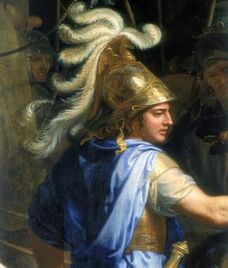 In 357 B.C. the revolt against the Athens began to spread. From 357 B.C. and 355 B.C., Athens had to face war against its allies. The caused The King of Persia to give an ultimatum to Athens. It demanded Athens to recognise its allies' sovereignty. Threat of Persia's sending two hundred Persian soldiers were the latter for the Athenians. This severely weakened Athenian Power ending the rule of Athens over Greece. Thebes after this event gained control all the way till 346 B.C. In 346 B.C. Macedon gained power in The Classical World thanks to The Leader Philip of Macedon. Between 359 B.C. to 336 B.C. Macedon took control over the Paeonians, the Illyrians & the Thracians. This was a great feat for Macedon but would soon be outshined by Macedon later Leader Alexander The Great. Tutored by The Philosopher Aristotle, Alexander The Great was well-equipped to become of The Best Kings and conquerors of All Time. His conquest consisted of Anatolia, Egypt, Mesopotamia, Gaza, Judea, Syria, Persia, Bacteria & Phoenicia. The End of The Classical World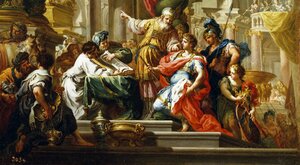 Alexander The Great conquered many lands and is World Famous Today. King Alexander is Legendary and his feats may never be forgotten. But like all things, The Legends may be immortal but The Legend is mortal. In 323 B.C. Alexander The Great died. When this event occurred this ignited another event; The end of The Classical World. Classical RomeClassical Rome will be discussed briefly. The Classical World mostly referred to Classical Greece, however Rome, India and China also take a spot in The Classical World so those two also will be briefly discussed. The Start of Classical Rome was in the 8th century B.C. and the end of Classical Rome was in 6th Century A.D. The Classical period of Rome began Romulus and Remus, the predecessors of the fallen city of Troja (Troy) founded The City of Rome. Well Romulus founded it and it was named after him. This started The Roman Kingdom which lasted till 509 B.C. when The Rex (King in Latin) was overthrown and The Roman Kingdom was replaced by The Roman Republic. The Roman Republic rule of law was administered primarily by The Senate; a body of law making representatives. The senate would soon dissolve thanks to large part by Julius Caesar; a Super Awesome Military Leader. He would go on to become dictator for life but this was ended very soon because of a coop of senators who conspired to assassinate him. This would not save The Roman Republic however, for his adopted son, Octavius, would become Princeps in name; Emperor in truth; known as Augustus Caesar; The First Emperor of Rome. The Roman Empire began. The Roman Empire would expand and eventually The Western Roman Empire aka Classical Rome would Fall in 476 A.D. Classical ChinaThe Start of Classical China was in the 5th Century B.C. and The End of Classical China was in 220 A.D. Classical China had many great historical figures. These included Confucius, Lao Tzu, Sun Tzu and more. The Silk Road thrived during this period connecting The Western World with The Eastern World. The Great Wall of China was built during Classical China. The main cause of the fall of Classical China was The Huns. Classical IndiaThe Start of Classical India was around 500 B.C and The End of Classical India was around 500 A.D. Classical India would see the creation of The Vedas, The Caste System, Buddhism, and Sanskrit. Classical India was ruled under The Gupta Empire. Classical India would fall due to a number of factors both internal and external. Eventually in 550 A.D. Classical India would say goodbye to The World. The Power Of The Classical World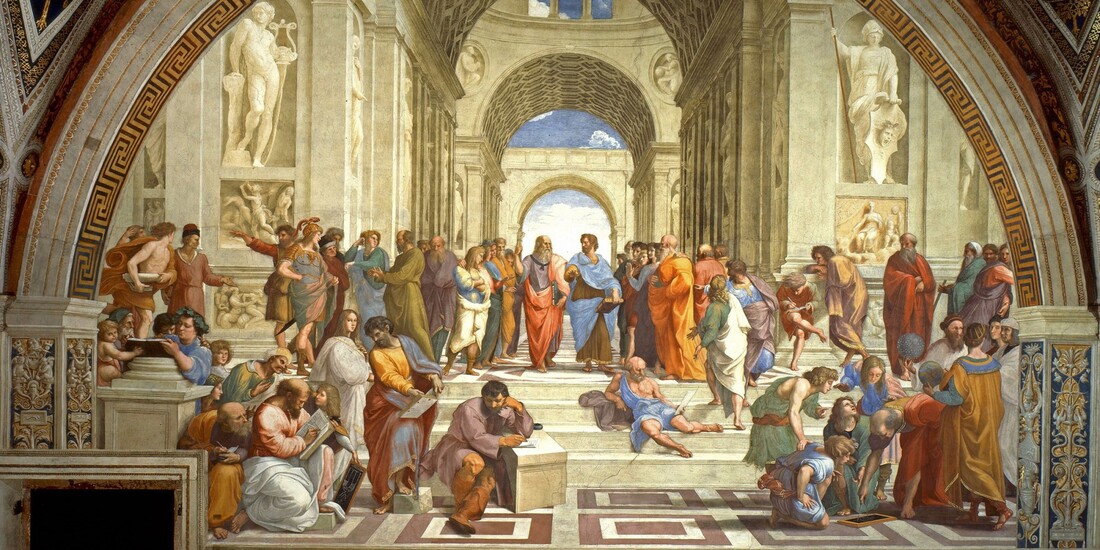 The Classical World has Major League Power in Today's World. Big Players like King Leonidas, Aristotle, Plato, Socrates, King Alexander The Great, Julius Caesar, Confucius & Augustus Caesar influenced a mass of Today's Philosophy, Politics and World views. Leonidas a Powerful, Strong, Courageous Leader who fought off valiantly against his people's enemies. Aristotle brought about The concept of Virtue and Vice and how they work. Plato discussed Ethics and Realism. Socrates made us know that we in fact do not know anything truly. Finally Alexander The Great was a Super Powerful, Domaniting, conquering King who showed the practice of Virtue over Vice. Without The Classical World, Today's World would look alot different and perhaps would not be as well off as it is today. One can say, The Classical World is The Creator of Today's World!
0 Comments
|
AboutWorld is dedicated to the subject of World History of Nations around The World! CategoriesSearch by Month
October 2020
|
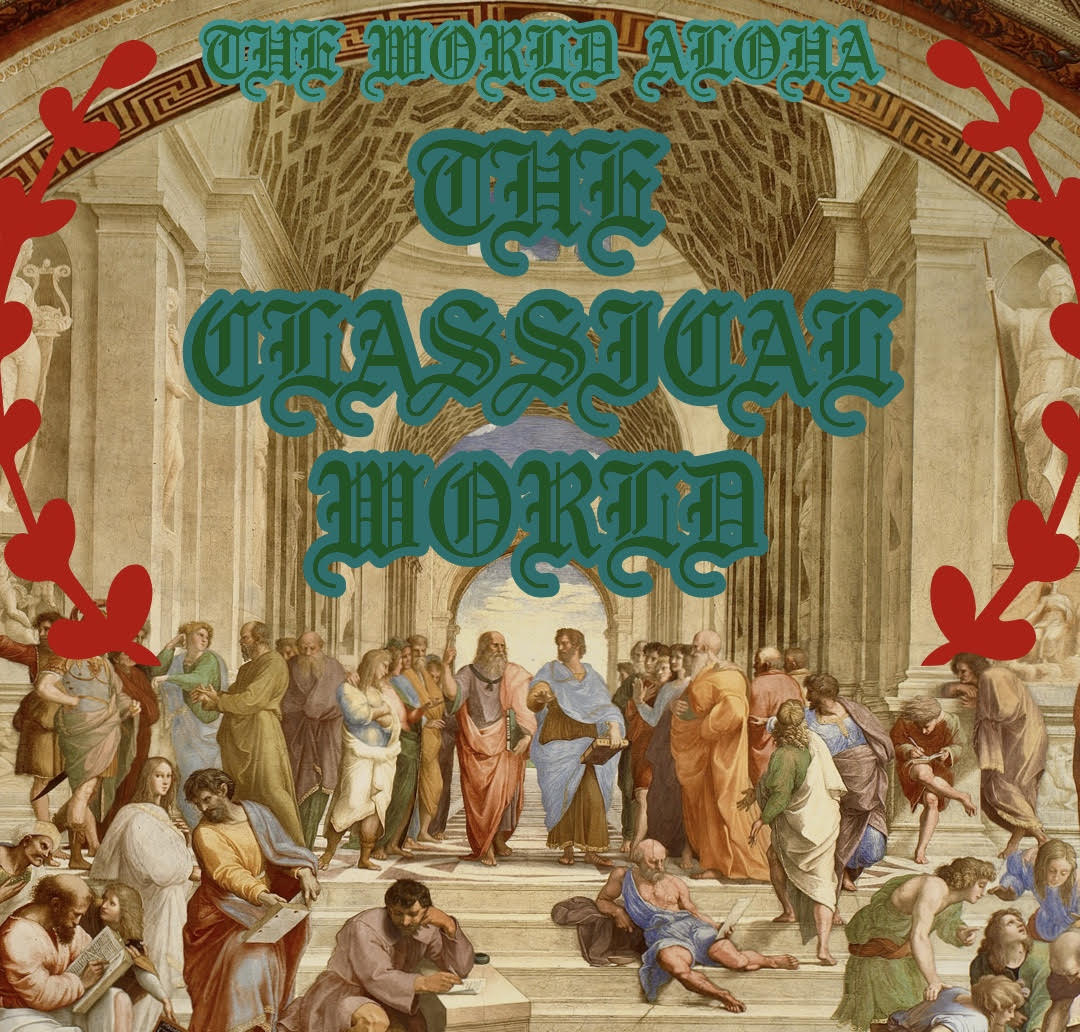
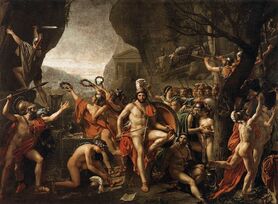
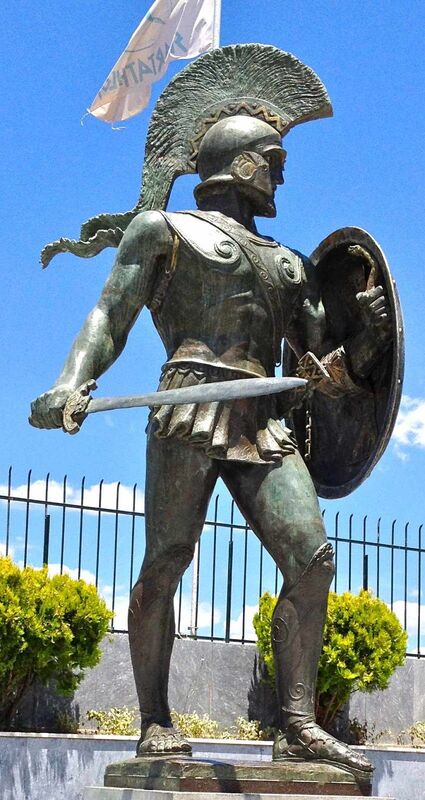
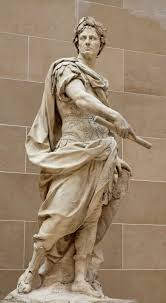
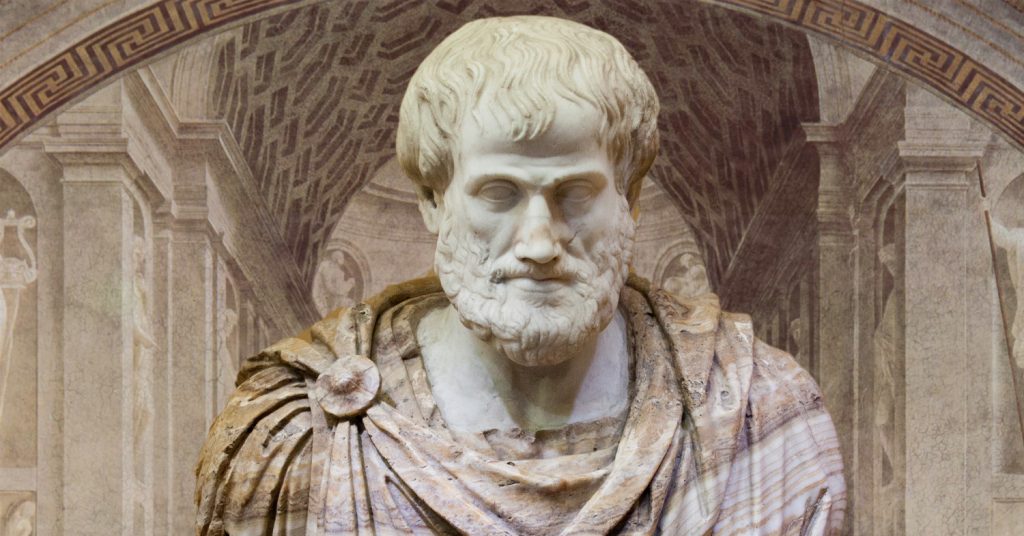


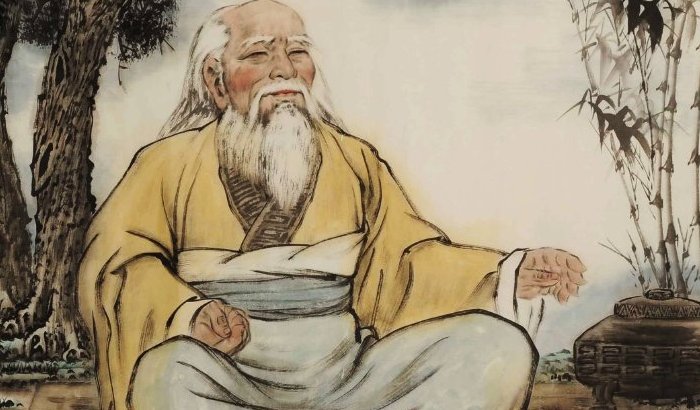

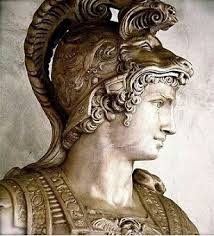
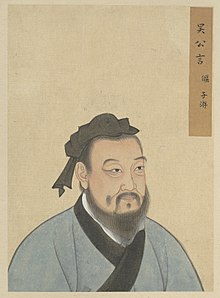
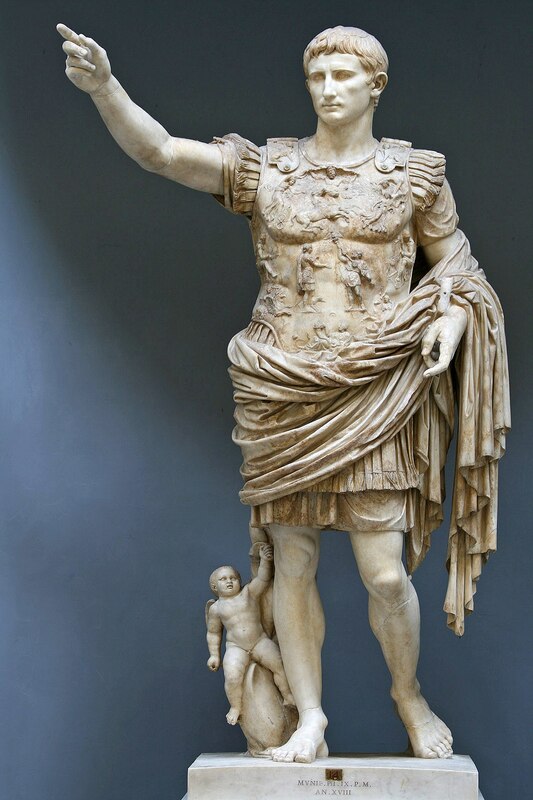
 RSS Feed
RSS Feed